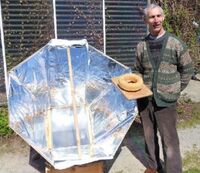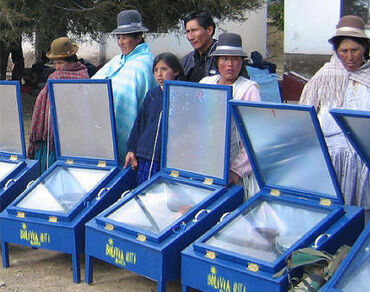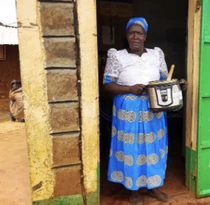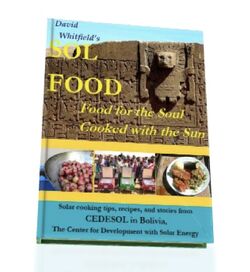|
Last edited: 20 April 2015
|
|
Bolivia Inti-Sud Soleil reports a decade of success - Bolivia Inti-Sud Soleil reports they have distributed more than 20,000 ecological appliances since 2000. From these 20,000, 14,000 have been solar cookers, mainly distributed in the South American countries of Peru, Bolivia, Chile, and Argentina. Additionally, 5,000 Rocket Stoves were distributed in the African countries of Benin, Chad, and Guinea, as well as to the South American countries. Besides solar cookers and stoves, they have also provided Heat-retention cookers, solar food dryers and solar showers. |
Events
Featured international events
- 4-6 June 2024 (Bridgetown, Barbados): Sustainable Energy for All Global Forum - The event will be co-hosted by Sustainable Energy for All (SEforALL) and the government of Barbados. It is a platform for government, business and finance leaders, entrepreneurs, and youth and community representatives from around the world to come together to broker new partnerships, spur new investment, and address challenges at the nexus of energy, climate, and development. More information...
Online events
- NEW: Thursday, 18 April 2024 (2:30pm-3:15pm EDT), (Washington, D.C., USA): ESMAP Spring Meetings Knowledge Café: Clean Cooking at the Heart of Energy Access - Join ESMAP for this exciting knowledge-sharing opportunity, which will showcase the role of clean cooking as a key part of energy access and energy transition. Presentations by René van Hell, Director of Inclusive Growth, Ministry of Foreign Affair, Netherlands, Dr. Kandeh Yumkella Chairman, Presidential Initiative on Climate, Renewable Energy and Food Security, Sierra Leone, and Chandrasekar Govindarajalu, Practice Manager, ESMAP, World Bank. In-person attendance at World Bank Atrium, MC Front Lobby is for Spring Meetings registrants only. However, you can watch the event online
Requests for proposal
- Decentralized Renewable Energy Solutions utilizing Solar and Bio-Energy - Sustainable Energy Technologies and Assessments of ScienceDirect, is requesting guest-author submissions. The special issue, VSI: DRES is devoted to publishing research articles reporting the innovative designs and design interventions in solar thermal and bio-energy for decentralized energy systems (DES). It includes i) new and novel designs of prototype or commercial devices and technologies, their development, modeling and simulations and experimental validation; ii) innovations for processes, techniques, utilization, and applications; iii) novel use of materials for improving efficiency, performance, techno-economic feasibility, and sustainability and iv) research findings addressing the socio-economic, health and safety impacts, and life cycle assessments leading to proposing novel devices for DES. The Deadline for submission is 31 July 2024. More submittal information...
- See also: Global Calendar of Events and past events in Bolivia
News and recent developments

- Bolivia Inti-Sud Soleil announces the sad passing of its founder, Robert Chiron - Read more - (English version) about professor Chiron's significant contribution to the spread of integrated cooking.
- May 2013: Written by David and Ruth Whitfield, Sol Food is a cookbook, but it isn't just a cookbook. In its pages you'll find all the information and advice you need to start solar cooking in your own backyard, plus over 54 solar cooking recipes to put on your table. The Whitfields are the founders of the CEDESOL Foundation, and they share many of team's adventures, gleaned from over a decade of not-for-profit work promoting solar cooking and integrated cooking techniques in Bolivia and around the world. A percentage of the profit from book sales help fund thier efforts. David reports that CEDESOL's application for their ecological stove project is inching forward. Once certified, CEDESOL wil be able to help fund their work through verified carbon credits. Sol Food is offered as an ebook in PDF format. More information...
- November 2012: CEDESOL Promotes Integrated Cooking Method - The Integrated Cooking Method (the combined use of solar, fuel efficient biomass and retained heat cooking devices) is the cornerstone of David and Ruth Whitfield’s CEDEDSOL Ecological Stoves for Better Living project in Bolivia and Paraguay. This CEDESOL project includes local production, promotion, ducation, distribution, installation and maintenance of improved cooking devices. The project will replace traditional inefficient wood stoves in rural and urban areas, with efficient designs, which have been shown to reduce fuel-wood consumption above 60%. This program is designed to generate Voluntary (verified) Emissions eductions (VERS) by installing and monitoring more than 50’000 Ecological Stoves in Bolivia and Paraguay. VERS to reduce the cost of the stoves to users will be provided by the foundation, myclimate. Without carbon finance obtained with VERS in association with Foundation My Climate, CEDESOL’s beneficiaries would not be able to access the program and receive the cookers and education. CEDESOL also acknowledges the generous assistance of Kyoto Twist Society and Green Microfinance.
The history of solar cooking in Bolivia
A very active promoting team, David Whitfield and his wife Ruth Whitfield, have established what is most likely the largest program on this continent. It is organized in conventional manner, with workshops held in various villages in which people are taught how to build their own wooden box cookers. Ruth is a Boliviana, and David an American who has lived in Bolivia for more than 30 years. In the last two years, they estimate they have taught more than a thousand people to make and use their own solar cookers. Fuel shortages are a substantial problem in this part of the mountainous region of South America, and the purchase of gas, sometimes a necessity, is very costly.
For a number of years, Ruth and David struggled along (and undoubtedly still do) with minimum resources of dollars but endless enthusiasm and faith in themselves and the potential of solar cooking. Several years ago, they were privileged to receive financial and technical assistance from the French organization INTI and for two years were yet more optimistic. Now that support has ended, and they are waiting for word on a pending Rotary International grant application.
The pilot program, required prior to application for a larger grant, was begun in 2003, when Wilfred Pimentel visited Bolivia for that purpose. If they receive the larger grant, the efforts of Sobre la Roca will be considerably enhanced.
Thus far, while more or less a hand to mouth operation, they have assisted households in dozens of villages to make and build their own cookers. They have also attempted to evaluate the usage of new cooks. When calculating the carbon emissions that did not enter the atmosphere because of the solar cookers, the figures are quite impressive, if hard to conceptualize. The story of the large Bolivian project is one of the continent's most impressive. It is important to note that estimates of having made and trained cooks of 1,000 households would make this among the larger programs on the continent, if not indeed the largest.
The Whitfields have actively sought to educate themselves about the entire range of solar devices and, indeed, about fuel efficient stoves and hay boxes, in the interest of assisting people to develop a complete and integrated cooking system for the household.
They have promoted parabolics with the cooperation of EG-Solar, a German group, which states that 200 such parabolic cookers have been distributed in South America, at a cost of around $90. The usual means of doing that is shipment of components, with local assembly, making shipping costs less and thus the device cheaper to the purchaser.
Currently, they have submitted a proposal for the U.S. Environmental Protection Agency, which sponsors a grant program that provides assistance for sustainable environmental activities around the world.
[Information for this section was taken originally from State of the Art of Solar Cooking by Dr. Barbara Knudson]
- Main article: History of solar cooking
Archived articles
See also
Climate, culture, and special considerations
See also Solar cooker dissemination and cultural variables
Resources
Possible funders for solar cooking projects in Bolivia
Reports
- February 2006: Christopher Pell Thesis, Solar Cookers in Bolivia: patterns of usage, social impacts and complexities of enumeration
Articles in the media
- September 2010: South-South Technology Transfer in Bolivia: A Solution for Local Health, Forests, and Our Global Climate - Solutions
Audio and video
- September 2010:
- March 2013:
CEDESOL - Changing Lives In Rural Bolivia
David Whitfield explains the challenges and successes CEDESOL has faced in the past, and their methods of educating the rural population about the integrated cooking approach in 2013.
- August 2010: A short film by Julia Kumari Drapkin. She speaks with Ruth Saveeda, A native Bolivian, who has worked to improve the lives of women and children in poor communities by introducing solar cooking. Like many areas, These communities are experiencing deforestation, and the smoke from traditional wood stoves has damaged the health of residents, beyond those directly involved with cooking. She helped found Sobre la Roca, which makes high quality solar box cookers from recycled materials as part of their efforts to spread her message.

|
Proyecto TAMBO (I) - Cocinas solares parabólicas en Bolivia - José Garrido |
- October 2014
Web pages
- July 2006: Una entrevista con Ruth Whitfield discutiendo sus numerosos proyectos con cocinas solares en Bolivia -
- Preguntas Frecuentes de la Cocción Solar
Contacts
The entities listed below are either based in Bolivia, or have established solar cooking projects there:
SCI Associates
- Main article: Solar Cookers International Association









